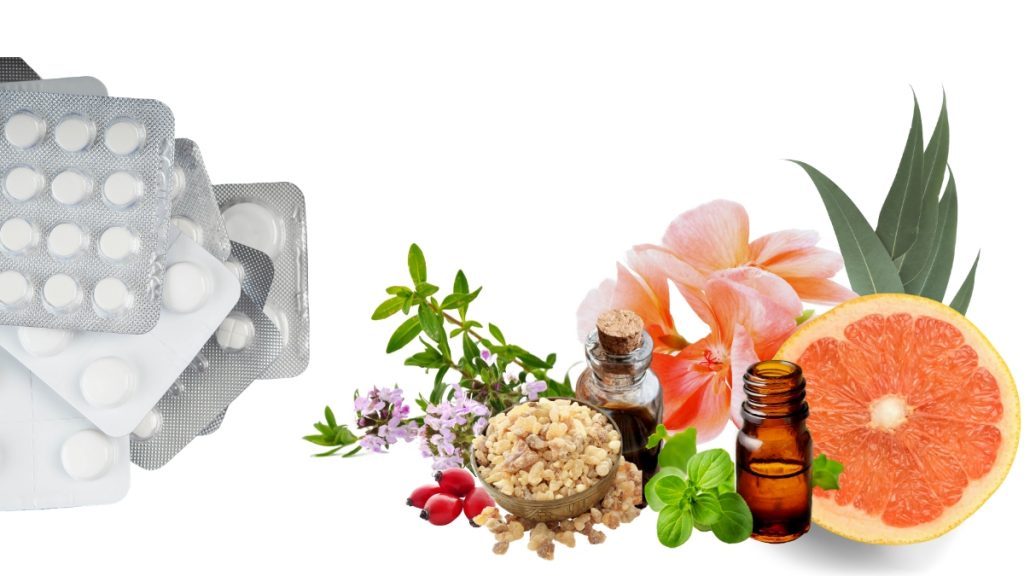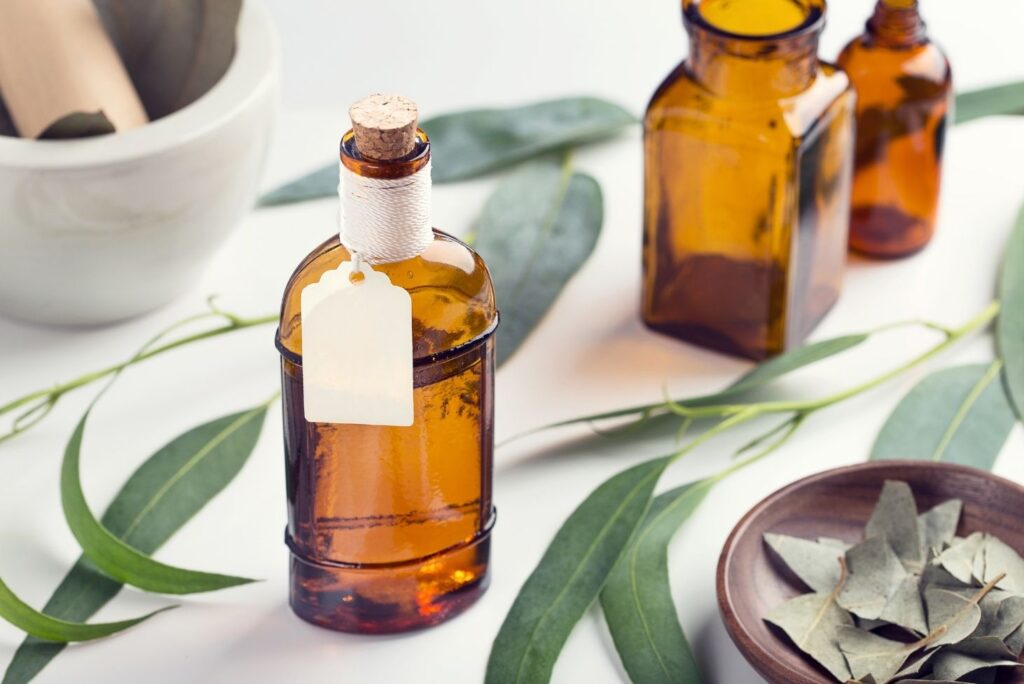Looking for natural alternatives to azithromycin? Continue reading and discover 8 effective natural alternatives to azithromycin and how to use them.
In This Article You Will Find:
What Is Azithromycin?
Azithromycin is a synthetic antibiotic that fights bacteria. Azithromycin is used to treat bacterial respiratory infections, skin infections, ear infections, eye infections, and sexually transmitted diseases. Now we want to talk about natural alternatives to azithromycin, which are powerful natural antibiotics, which modern medicine should look more into. Let’s begin!

8 Natural Alternatives to Azythromicin
1. African Geranium Root
(Pelargonium sidoides)
The natural active substance in African geranium root, EPs 7630, covers the mucosa of the respiratory tract with a kind of protective film, thus preventing bacteria from attaching to it. More so, studies have proven that this extract is a great alternative treatment for acute upper respiratory tract infections, including acute bronchitis, tonsillopharyngitis, sinusitis, and the common cold.
This natural antibiotic does not create antibiotic resistance, as most synthetic antibiotics do.
EPs 7630 also promotes phagocytosis. This is the process in which the white blood cells eat and digest pathogens. In addition, it stimulates the activity of cytotoxic T lymphocytes. They destroy the infected cells from the inside out, killing all the bacteria that have succeeded to penetrate them. The mechanism is the same in the case of viral infections. Hence this is why geranium may be one of the best natural alternatives to azithromycin.
Read Also: Make Your Own 100% Natural Hand Sanitizer
According to the same study, the recommended dose of EPs 7630 for adults and children over the age of 12 years is 1.5 ml three times per day for 7 to 10 days. Children ages 6 to 12 years may take 1.0 ml three times per day. For children 2 to 5 years of age, the dose is 0.5 ml three times per day. This simple root has been successfully used in the empirical treatment of upper and lower respiratory tract diseases, due to its antimicrobial, antiviral, and immunomodulatory activity. More recent studies come to back this up.

2. Oregano Oil
(Origanum vulgare)
The substance called carvacrol, present in wild oregano oil makes it one of the most powerful natural antiviral, antibacterial, and antifungal medicine. Carvacrol kills every kind of parasite. US researchers compared oregano carvacrol to Tinidazole, a drug prescribed for the treatment of giardia. The results showed that oregano oil is more effective than Tinidazole. A British study compared the action of oregano oil with the action of 18 of the most popular antibiotics.
It has been shown that oregano, due to its high carvacrol content, is more effective than conventional antibiotics, destroying bacteria resistant to some antibiotics. Carvacrol acts on the whole body and can be used both internally and externally.
Read Also: 5 Best Herbs for Viral Lung Infections and How to Use Them
Adults’ dose is 5 drops, 3-5 times a day.
The oil has an extremely strong and stinging aroma, so start with one drop a day, increasing the dose with each day. Dissolve the oil in a little water or, best, mix in a teaspoon of honey. Keep it in the mouth for a short time, enough to inhale the aromatic vapors of the oil, then swallow. For lung or sinus infections, in addition to oral administration, do oregano oil steam inhalations. This is one of the best natural alternatives to azithromycin.

3. Colloidal Silver
Its name comes from the Latin “argentum“, which means “bright white“. Silver is a natural antibiotic, highly praised for its anti-infectious virtues and for its inhibitory properties in preventing the spread of certain bacteria. Colloidal silver deactivates certain enzymes that help bacteria multiply.
It is used as a natural antibiotic for ENT conditions (laryngitis, pharyngitis, otitis) as well as influenza with great results. Colloidal silver can also be used topically, as a healing agent for the mucous membranes, especially in cancer sores of the mouth, and conjunctivitis. Colloidal silver has also been used for coating endotracheal tubes in order to prevent pneumonia, due to its antimicrobial properties. This is why colloidal silver is one of the top natural alternatives to azithromycin out there.
4. Grapefruit Seeds Extract
(Citrus paradisi)
Grapefruit seeds extract is one of the most powerful natural antibiotics out there. The reason is that grapefruit seed extract has the widest spectrum of use of a natural antibiotic, at the time. This simple extract can kill no less than 800 (!) known strains of bacteria, including some that are resistant to synthetic antibiotics. At the present moment, there is only one bacterium that grapefruit seeds extract cannot kill and that is Pseudomonas aeruginosa.
In addition, once entered the human body, this extract has a natural toxins annihilation effect, helping to lower cholesterol and blood glucose, and boost immunity among others. Grapefruit seeds extract is a great natural alternative for azithromycin and other antibiotics in the fight against cold and flu, relapsing bronchitis, and pneumonia. It also helps fight yeast infection, kills off parasites, and cleanses the body from heavy metals. These are only a few reasons why grapeseeds are one of the best natural alternatives to azithromycin.

5. Thyme Oil
(Thymus vulgaris)
Thyme oil is another amazing natural alternative to azithromycin and one of the most powerful natural antibiotics there is. This plant contains thymol, an ethereal oil that stops the spread of bacteria, viruses, and fungi. Besides, it favors expectoration, so it is amazing for respiratory tract infections caused by bacteria and viruses. In addition, red thyme essential oil inhibits the growth of Escherichia coli O157: H7 and Staphylococcus aureus.
Thyme oil in combination with clove oil is especially effective for respiratory infections, but thyme oil is also amazing for cold and other upper respiratory tract infections. Using thyme oil as a natural antibiotic does not create bacterial antibiotic resistance, as most conventional antibiotics do, and is one of the best natural alternatives to azithromycin.
6. Myrrh & Eucalyptus
Myrrh and eucalyptus are related plant species, and they share some similar healing properties. Most importantly, they are both amazing natural antibiotics. Myrrh tincture (Commiphora molmol) contains a substance that stops the proliferation of bacteria and reduces inflammation in the throat, pharynx, nasal cavities, and bronchi. It is one of the oldest herbal remedies that has been widely used in ancient Egypt. Studies have shown promising results in using this oil to treat Trichomoniasis vaginalis infection, a common STD.
Eucalyptus oil (Eucalyptus globulus) is another amazing natural antibiotic from the Myrtaceae plant family. The ethereal oils from eucalyptus treat respiratory tract infections, by stopping the development of bacteria and viruses. These oils also block the neurotransmitters that, for instance, narrow the bronchi in asthma patients. Eucalyptus oil has proven broad-spectrum antibacterial, antifungal, and antiviral properties.

7. Rose Hip Extract
(Rosa canina)
The polysaccharides and caffeic acid derivatives in rose hips stimulate the immune system, activate phagocytes, and prevent viruses from entering body cells. In addition to being amazing natural antibiotics, rose hips are known for their high Vitamin C content. But even more, they contain a natural antihistamine called quercetin. Rosehip is a powerhouse. A 2015 study by The Institute of Medicinal Plant Research in Belgrade revealed the antibiotic effect of rose hips. The study showed that these berries inhibit the growth of Pseudomonas aeruginosa, Staphylococcus aureus, Leishmania monocytogenes, and Escherichia coli by 90%. This proves, even more, the natural antibiotic effect of rose hips. This is one of the top natural alternatives to azithromycin.
8. Olive Leaf Extract
(Olea europaea)
It has been scientifically confirmed by numerous studies that olive leaves have a natural antibiotic effect with a broad antibacterial spectrum (Escherichia coli, Staphylococcus aureus, Streptococcus, Pseudomonas, mycobacteria, enterococci), antiviral (influenza viruses, herpes), antifungal (Candida, Aspergillus, Microsporum Trichophyton) and anthelmintic. Studies have shown that oleuropeins in olive leaves have the ability to penetrate the lipoprotein shell of germs, thus inhibiting RNA replication.
Read Also: 10 Best Natural Sources of Zinc
Unlike synthetic antibiotics, this natural extract destroys only pathogenic bacteria, and not healthy gut bacteria. Olive leaf extract can also increase immunity by directly stimulating phagocyte production. These special cells of the immune system have the ability to engulf germs, toxic waste, and other dangerous foreign cells from the body.
Taken together with Astragalus and Reishi (Ganoderma lucidum), the olive leaf extract is a powerful immunomodulatory and antimicrobial powerhouse, and one of the best natural alternatives to azithromycin.

Why Go For Natural Antibiotics?
The most common side-effects of conventional antibiotics are digestive disorders, diarrhea, and candida. But their damage is far greater than this. They destroy the beneficial bacterial flora in the gut and thus lower immunity. Synthetic antibiotics can also cause allergies in young children. And these are all long-term effects. At the same time, some studies agree that taking conventional antibiotics at a very young age can cause asthma.
Prolonged and repeated antibiotic treatments create resistant bacteria, which will require much stronger treatment to fight off. Antibiotic resistance is a growing public health problem, largely caused by inadequate antibiotic use.
Read Also: 10 Strongest Natural Antibiotics and How to Use Them
On the other side, natural antibiotics have no side effects because they empower the body to fight bacteria and viruses. Hence, they destroy viruses and, at the same time, strengthen the body’s resistance, by increasing its natural defense capacity. If you’ve enjoyed learning about the natural alternatives to azithromycin, please share this article so more people can use this information. Stay healthy, naturally!
Share on Pinterest ❤️


6 comments
Hi, power to the natural healing plants. I also believe in my ancestors as they normally reveal natural healing plants to me, and it works amazingly. I DO BELIEVE
Yes, healing plants do work, much health and happiness to you, thank you for stopping by 🙏🏻💚
I have been taking Azithromycin 250mg to start for several years. Then the dosage was increased to 500mg daily for about 6 more years. It was prescribed to help prevent my Auto-Immune illness known as Fibromyalgia from escalating into possibly another Auto-Immune illness. What natural antibiotic can I take (ie: Olive Leaf 750mg or?) that would be an alternative to taking Azithromycin?
Hi Anne Marie! For the exact dosage please consult a certified naturopath. Much health to you! 💚
Hi. Enjoyed the article. Would you recommend a specific treatment from your article list for STI’s such as chlamydia, gonnorhea? Don’t want to take Azithromycin and prefer natural alternatives. Thanks!
Hello, Ty!
Thank you for reaching out. We cannot recommend a specific treatment/dosage for STIs, namely chlamydia, gonorrhea, but I know that Azithromycin is one of the best antibiotics for chlamydia, so you’re on the right track. Oregano oil capsules, thyme essential oil and grapefruit seed extract may be the best options for you in your case (I put links to the best brands we know), and we recommend taking them according to the instructions on the package. Also, STDs are more common in individuals with severe Zinc deficiencies, hence a good Zinc supplement can also help support your healing. It’s important to follow a healing, anti-inflammatory diet. We recommend Medical Medium’s guidelines: https://www.medicalmedium.com/blog/foods-to-avoid-for-healing-chronic-illness I hope we helped, much health to you!